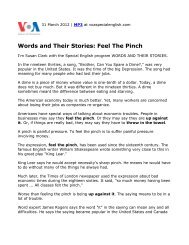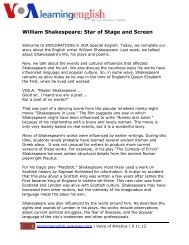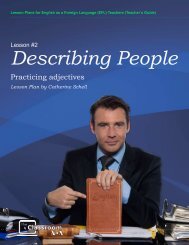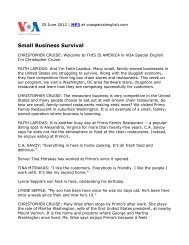Modals: can, may and will verbs: present tense - VOA
Modals: can, may and will verbs: present tense - VOA
Modals: can, may and will verbs: present tense - VOA
You also want an ePaper? Increase the reach of your titles
YUMPU automatically turns print PDFs into web optimized ePapers that Google loves.
LESSON (cont.)<br />
This table reflects different conjugations <strong>and</strong> uses of the modals:<br />
On Facebook: <strong>VOA</strong> LearningEnglish<br />
Learn English with the English Doctor <strong>and</strong><br />
the English Traveler at www.voanews.com/theclassroom<br />
Lesson Plans for English as a Foreign Language (EFL) Teachers Guide<br />
Note: although it is very common among teachers of English to <strong>present</strong> <strong>will</strong> as an expression of the<br />
future, it is completely erroneous. It is a modal that expresses, among other things, a probability. Other<br />
modals that share the same characteristic are <strong>may</strong>, might <strong>and</strong> would.<br />
It is of utmost importance that you underst<strong>and</strong> that the ‘<strong>tense</strong>s’ shown in the table are not correlated to<br />
the time of the action in statements. For instance, <strong>may</strong> <strong>and</strong> might <strong>can</strong> be used in the following sentence;<br />
the only difference in meaning is that the probability of the event is greatly reduced when you use<br />
might:<br />
I <strong>may</strong>/might go to the movies today if I have time.<br />
When you use the past form of a modal (might, could, would) the probability or physical capacity that<br />
is expressed by the modal is greatly reduced from its use in the <strong>present</strong>. As a consequence, could <strong>and</strong><br />
would are seen as being more polite in questions than their counterpart <strong>can</strong> <strong>and</strong> <strong>will</strong>:<br />
Can Could you tell me where the nearest metro is please?<br />
Will Would you lend me two dollars to buy a coffee please?<br />
Using the modals with the negation is very easy. Just add not after the modal. Pay special attention to<br />
<strong>can</strong>, however: you <strong>may</strong> write it <strong>can</strong>’t (informal) or <strong>can</strong>not (formal). Will is also quite specific: it is<br />
written won’t (informal) or <strong>will</strong> not (formal).<br />
Voice of America’s EFL<br />
Teaching Community<br />
Lesson 7: Page 5<br />
06.20.11






